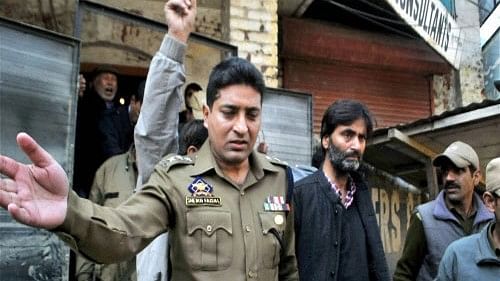
Jammu and Kashmir Liberation Front chief Yasin Malik.
Credit: PTI Photo
New Delhi: The Delhi High Court on Friday directed the Superintendent of the Tihar Jail to ensure proper medical treatment to separatist leader Yasin Malik, who is serving life sentence in a terror funding case.
Malik claims to be suffering from serious cardiac and kidney problems.
The high court was informed by the counsel for the Central government and Director General of Prisons (Tihar Jail) that the petition suffers from serious suppression of facts and that Malik was refusing treatment being given to him by authorities.
Justice Anoop Kumar Mendiratta asked the counsel for the Centre and DG (Prisons) to produce the record to show that the inmate was refusing treatment and also asked the superintendent of the jail concerned to place before it the medical report of Malik by the next date of hearing.
Malik’s plea seeking a direction to the authorities to produce the record of his treatment and refer him to AIIMS or any private super specialty hospital here or in Jammu and Kashmir for proper and necessary treatment as he was suffering from serious cardiac and kidney ailments is listed for February 14.
The petition has been filed on behalf of Malik through his mother Aatika Malik.
As the counsel for the authorities contended that Malik was a “very high risk security prisoner” and therefore, the medical team can be brought in the jail itself, the court asked him to place his stand in writing so that it can be considered.
Advocate Rajat Nair, representing the Centre and DG (Prisons), contended that a medical board was constituted by the All India Institute of Medical Sciences (AIIMS). However, Malik refused to be examined.
He said nowadays consultation with doctors is being held through video conferencing in jail but the inmate wants to go to the hospital physically.
He added that senior professors from AIIMS were called for diagnosis twice but he refused and the authorities are willing to arrange another consultation with the doctors.
On being asked by the court as to what was the objection, Malik’s lawyer said he was earlier being treated by other doctors and suddenly the authorities have changed the doctors and a new medical board has been formed.
The counsel further said he will seek instructions from his client if he would like to opt for examination by the same set of doctors or by another set of his preference.
“Tell us the reason that you feel prejudiced if examined by these current doctors. How can we presume anything against the doctors? You have a right of treatment which is well recognised and we appreciate it.
“But to say that you want to be treated by some particular doctor, we have a reservation to it,” the judge told Malik’s counsel.
During the hearing, Nair further submitted that Malik is not required to be admitted to a hospital but he was only required to be examined as an OPD patient.
The high court said in case a patient requires an examination inside the hospital it can’t be insisted that he will be examined in jail only and asked the authorities’ lawyer to get instructions in this regard as the prisoners also have a right to health.
To this, Nair said, “the state is duty bound to give the right of health to an inmate but he is a very high risk security prisoner and therefore, the medical team can be brought in the jail itself”.
The court said, “In the meantime, the superintendent of jail is directed to ensure that any treatment required by the petitioner is duly provided to him at the jail hospital in accordance with the law”.
The Jammu and Kashmir Liberation Front chief was awarded life imprisonment by a trial court here on May 24, 2022, after holding him guilty for various offences under the stringent Unlawful Activities (Prevention) Act (UAPA) and the IPC.
The National Investigation Agency (NIA) has filed an appeal in the Delhi High Court seeking enhancement of the sentence from life term to death penalty, which is the maximum punishment for the offence.
The life term was awarded for two offences - section 121 (waging war against government of India) of IPC and section 17 (raising funds for terrorist act) of the UAPA.
The court had awarded Malik 10-year jail term each under sections 120 B (criminal conspiracy), 121-A (conspiracy to wage war against the government of India) of IPC and sections 15 (terrorism), 18 (conspiracy for terrorism) and 20 (being a member of terror organisation) of UAPA.